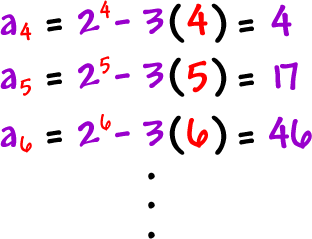Remember when I did that list with the a's to describe a sequence...

And I told you this was the nth term?
That probably didn't mean much to you at the time. Here's what we use this for:
The nth term is given by a formula.
We can use this formula to build the sequence.
Check it out:
Let's build the sequence whose nth term is given by
![]()
See the n's in this guy ![]() ?
?
If we let n = 1, we'll get the first term of the sequence:
![]()
If we let n = 2, we'll get the second term:
![]()
If we let n = 3, we'll get the third term:
![]()
and so on...

So, our sequence is
![]()
It's easy!
When you're given a formula for ![]() , you stick in n = 1, then
, you stick in n = 1, then
n = 2, then 3, 4, and 5 to get the first five terms.
TRY IT:
Build the sequence (the first five terms) whose nth term is given by
![]()